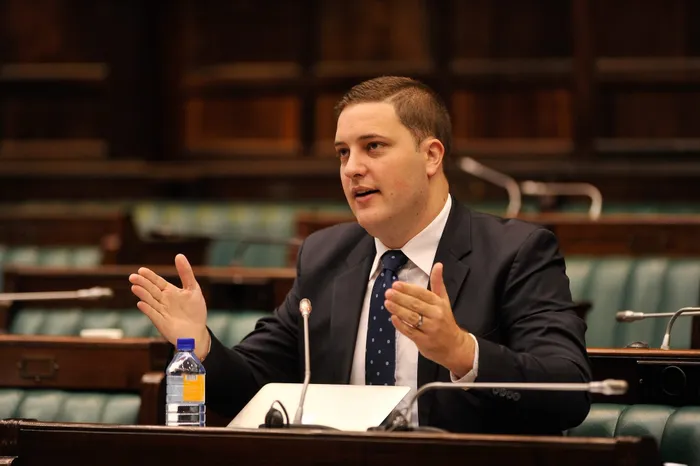
Cape Town Mayor Geordin Hill-Lewis announces major tariff cuts and confirms the City’s R40 billion infrastructure commitment during the tabling of the amended 2025/26 "Invested in Hope" budget .
Image: Henk Kruger / Independent Newspapers
Cape Town Mayor Geordin Hill-Lewis has tabled major changes to the City’s 2025/26 "Invested in Hope" budget, slashing proposed tariffs to ease the burden on ratepayers, while maintaining an ambitious infrastructure investment plan valued at R40 billion.
Hill-Lewis said that these additional measures will complement the existing wide-ranging relief already contained in this budget
He confirmed that the relief will “bring meaningful relief to more homes, with bills lowering by up to 35% compared to the March budget for households under R7 million in value.”
Responding to feedback from Capetonians, the mayor said the amended budget will result in “meaningfully lower increases to bills” compared to the version tabled in March.
“We have listened carefully to ratepayers in higher value properties,” Hill-Lewis said.
“And do agree that not everyone in higher value homes is wealthy or cash-flush.”
The city has extended the rates-free benefit from R5 million to R7 million in property value and raised the qualifying income threshold for pensioner rebates from R22,000 to R27,000 per month.
“A pensioner rebate for City-Wide Cleaning has also been included, which will offer up to 100% off this charge,” he announced.
Homes valued at R1.2 million will see up to 15% lower monthly bills, while those between R5 million and R7 million could see reductions of up to 40%. According to the mayor, “the relief will be even greater” for pensioners.
Yet despite this extensive relief, the City is not backing down on infrastructure. “We cannot cut or re-phase this City’s infrastructure budget.
There are no luxury or optional major infrastructure projects in this budget that are not urgently needed,” Hill-Lewis said.
He added that 75% of the R40 billion budget “will directly benefit lower-income households.”
Projects include upgrades to wastewater plants, sewer and water pipe replacements, new water sources, and the ongoing MyCiTi expansion from Khayelitsha and Mitchells Plain to Wynberg and Constantia.
“These are just some of the reasons why we must keep intact our South African-record R40bn infrastructure budget,” he said.
Fixed charges will remain part of the system to ensure financial sustainability. “Many costs are fixed in nature, pipelines, trucks, chemicals, cables, staff to service it all,” Hill-Lewis explained.
“These costs remain no matter how much people consume, and so fixed costs must be met with a portion of fixed revenue.”
He stressed the importance of fairness in how the city funds services.
“We cannot sustainably run a city where a R50 million household makes the same fixed contribution to water and sanitation infrastructure as a R500,000 household. Let’s call that what it is, regressive taxation, and we oppose it.”
On electricity pricing, Hill-Lewis confirmed that from July, the per-unit charge will decrease.
“This is made possible by discontinuing the 10% cost embedded in electricity prices that previously paid for city-wide cleaning.”
Hill-Lewis dismissed reports of skyrocketing increases, stating, “97% of ratepayers won’t experience the often-repeated +20% increase in monthly bills, and virtually no one will experience a 30% increase on any reasonable household consumption scenario, let alone the fabled 40% of a recent clickbait report.”
He concluded by reaffirming the City's long-term vision:
“We are well on the path of raised infrastructure investment, together with ratepayers whom we most warmly thank for their contributions, we are truly on the path to building a city of hope for all.”
Cape Argus
Related Topics:
